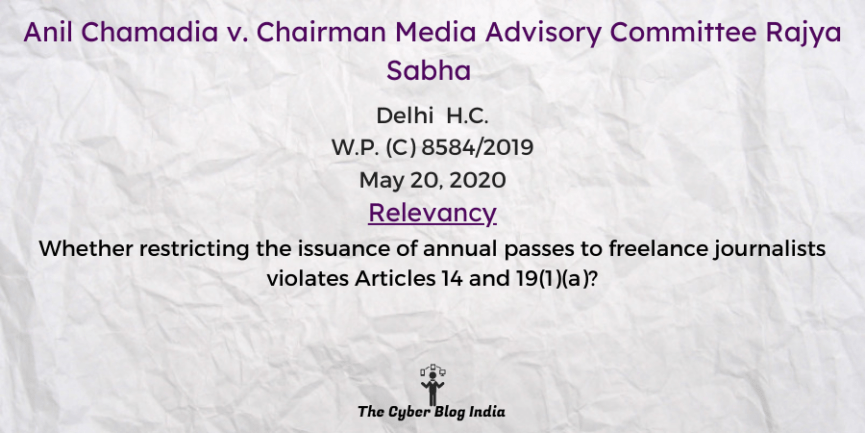Anil Chamadia v. Chairman Media Advisory Committee Rajya Sabha

Anil Chamadia v. Chairman Media Advisory Committee Rajya Sabha
In the High Court of Delhi
W.P. (C) 8584/2019
Before Justice Navin Chawla
Decided on May 20, 2020
Relevancy of the case: Whether restricting the issuance of annual passes to freelance journalists violates Articles 14 and 19(1)(a)?
Statutes and Provisions Involved
- The Constitution of India, 1950 (Article 14, 19(1)(a))
Relevant Facts of the Case
- The petitioner has filed the present petition to challenge the decision of the Media Advisory Committee (“MAC”) of the Rajya Sabha. This particular decision restricts the issuance of passes to the journalists under the freelance category to only sessional passes. It discontinues the earlier practice of issuing an annual pass to freelance journalists.
- The petitioner also pleads for a writ of mandamus directing the respondents to issue a permanent pass to the petitioner for covering the proceedings of the Rajya Sabha.
- Earlier, MAC had accepted the petitioner’s request for a permanent pass to the Rajya Sabha Press Gallery in its January 01, 2009 meeting. He continued to hold this pass until the impugned decision. MAC took the impugned decision in its meeting on July 06, 2017.
Prominent Arguments by the Advocates
The petitioner’s counsel submitted that:
- The impugned decision violates his fundamental right under Article 19(1)(a). This decision also violates Article 14, as it fails to give any reasonable basis for treating freelance journalists as a separate category from accredited journalists.
- The counsel relied on the Apex Court’s judgement in Indian Express Newspapers (Bombay) (P) Ltd. v. Union of India, (1985) 1 SCC 641 and Naveen Jain v. Union of India AIR 2019 SC 5087.
- He further contended that MAC’s decision creates a divide and treats freelance journalists unequally and inferior to accredited journalists from media houses.
The respondent’s counsel pointed out that:
- Before 2008, freelance journalists could not avail annual passes till 2008. In its meeting on September 19, 2008, MAC considered the request of issuing annual/sessional passes to freelance journalists of repute based on merit and case-to-case basis. Accordingly, the petitioner and three other freelance journalists were recommended for annual passes in 2009.
- Further, in its meeting on November 19, 2011, MAC decided to issue only sessional passes to freelance journalists. MAC adopted the “Guidelines for Accreditation of Journalists under the Freelance Category” (“Guidelines”) afterwards.
- Clause 5 of the Guidelines restricted the number of passes for freelance journalists. Clause 6 provided that only sessional passes, and not more than two temporary passes not exceeding two weeks in a session, shall be issued to freelance journalists. With this guideline’s adoption, an anomalous situation arose. Three freelance journalists held annual passes, while others could only get a sessional pass.
- A MAC sub-committee observed in its May 2017 report that issuing two different types of passes for freelance journalists is a discriminatory and unjust practice. The sub-committee recommended only sessional passes for freelance journalists, along with discontinuing the annual passes of the earlier-mentioned three freelance journalists.
- In its meeting on July 06, 2017, MAC accepted these recommendations. The petitioner has challenged the decision of MAC in this meeting. As for the two other freelance journalists, they have availed of sessional passes after the expiry of their annual passes.
- The counsel relied on the judgement in Dr Jagdish Prasad Gaur v. The Secretary General, Rajya Sabha. In this judgement, the court had observed that entry into the Parliament House is in the nature of privilege. It is open to the Secretariat of the two Houses to regulate the access therein.
- The counsel further submitted that the impugned decision aligns with the Guidelines. It does away with the discriminatory practice of issuing two types of passes to journalists of the same category. Therefore, the impugned decision neither violates Article 19(1)(a) nor Article 14. The petitioner can still report Rajya Sabha proceedings based on a sessional pass.
Opinion of the Bench
- The petitioner has only challenged the MAC’s decision on July 06, 2017. This decision merely did away with the discriminatory practice of issuing two different kinds of passes to the same category of journalists. MAC’s decision on November 19, 2011, is not challenged in this petition. This is significant because the petitioner’s counsel’s submissions indicate they sought to challenge the MAC’s decision on November 19 2011. In light of this, the petitioner’s submission that MAC’s decision is discriminatory is of no merit.
- Since the petitioner has not challenged the 2011 decision, the court refrains itself from proceeding further and discussing the merits of this decision. However, the respondent should revisit the Rules and Guidelines in line with Article 19(1)(a).
- The court also noted the Supreme Court’s observations in Shreya Singhal v. Union of India. It is not open to the State to curtail freedom of speech to promote the general public interest.
Final Decision
- With the above observations, the court dismissed the present petition.
